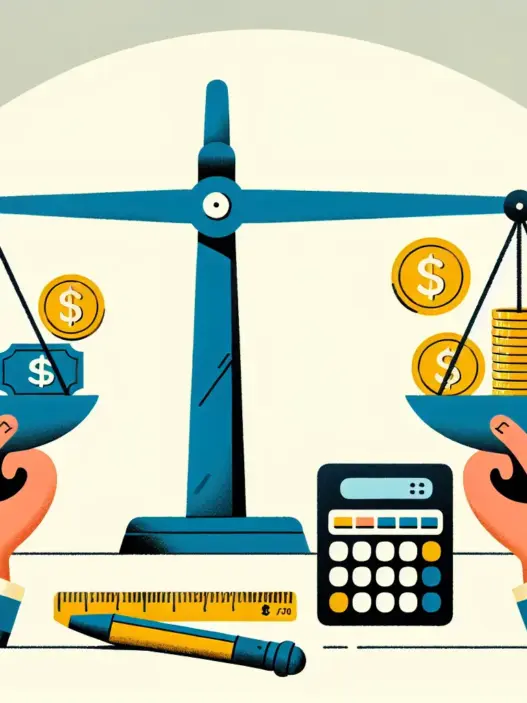Inflation is a silent force that can erode the value of your hard-earned savings over time. Understanding its impact and learning how to protect your money is crucial for maintaining financial stability. In this article, we’ll explore the effects of inflation on your savings and provide practical strategies to help you stay ahead.
Understanding Inflation and Its Effects
Inflation is the general increase in prices of goods and services over time, resulting in a decrease in the purchasing power of money. When inflation rises, each dollar in your savings account buys less than it did before. This means that if your savings don’t grow at a rate that matches or exceeds inflation, you’re effectively losing money.
For example, if you have $1,000 in a savings account with a 1% interest rate, but inflation is at 2%, your money is actually losing 1% of its value each year. Over time, this can significantly impact your financial goals, especially for long-term objectives like retirement planning.
The Importance of Beating Inflation
Staying ahead of inflation is crucial for preserving and growing your wealth. If your savings don’t keep pace with inflation, you risk falling behind financially. This is particularly important for long-term goals, such as saving for retirement or your children’s education.
To beat inflation, you need to find ways to make your money grow faster than the rate of inflation. This often means looking beyond traditional savings accounts and exploring other investment options that offer higher potential returns.
Strategies to Protect Your Savings from Inflation
1. Diversify Your Investments
One of the most effective ways to combat inflation is to diversify your investments. This means spreading your money across different asset classes, such as stocks, bonds, real estate, and commodities. By diversifying, you can potentially benefit from the growth of various sectors and reduce your overall risk.
Consider investing in a mix of mutual funds or index funds that track broad market indices. These can provide exposure to a wide range of companies and industries, helping to protect your savings against inflation.
2. Explore Inflation-Protected Securities
Treasury Inflation-Protected Securities (TIPS) are government bonds designed to protect investors from inflation. The principal of these bonds increases with inflation and decreases with deflation, as measured by the Consumer Price Index. This can provide a safeguard for your savings against rising prices.
While TIPS may not offer the highest returns, they can be an important part of a well-rounded investment strategy, especially for those nearing retirement or seeking to preserve their purchasing power.
3. Consider Real Estate Investments
Real estate has historically been a good hedge against inflation. Property values and rental income tend to increase with inflation, making real estate an attractive option for long-term investors. You can invest in real estate directly by purchasing property or indirectly through Real Estate Investment Trusts (REITs).
If you’re a first-time home buyer, investing in your own home can also be a way to protect against inflation, as your mortgage payments remain fixed while your home’s value potentially increases over time.
4. Invest in Stocks for Long-Term Growth
While stocks can be volatile in the short term, they have historically outpaced inflation over the long run. Investing in a diversified portfolio of stocks or stock-based mutual funds can help your savings grow faster than inflation.
Focus on companies with strong financials and a history of increasing dividends. These companies are often better equipped to handle inflationary pressures and can pass on increased costs to consumers, protecting their profitability and your investment.
Smart Savings Habits to Combat Inflation
1. Regularly Review and Adjust Your Budget
To stay ahead of inflation, it’s essential to regularly review and adjust your budget. As prices increase, you may need to cut back on certain expenses or find ways to increase your income. Budgeting helps you identify areas where you can save money and allocate more towards investments that can beat inflation.
Consider using budgeting apps or tools to track your spending and identify areas where you can cut back. This can help you free up more money to invest and grow your savings.
2. Increase Your Savings Rate
One way to combat the effects of inflation is to simply save more. By increasing your savings rate, you can potentially offset the decreased purchasing power of your money. Look for ways to boost your income, such as taking on a side hustle or negotiating a raise at work.
Remember to prioritize your emergency fund as well. Having a solid financial cushion can help you avoid taking on high-interest debt when unexpected expenses arise, which can be particularly damaging in an inflationary environment.
Conclusion
Inflation can have a significant impact on your savings, but with the right strategies, you can protect and grow your wealth. By diversifying your investments, exploring inflation-protected securities, considering real estate, and maintaining smart savings habits, you can stay ahead of rising prices and secure your financial future.
Remember, the key to beating inflation is to be proactive and consistent in your financial planning. Regularly review your investment strategy, stay informed about economic trends, and don’t hesitate to seek advice from a financial advisor if needed. With careful planning and smart decision-making, you can ensure that your savings continue to grow and maintain their value, even in the face of inflation.
Frequently Asked Questions
How does inflation affect my savings?
Inflation erodes the purchasing power of your money over time. If your savings don’t grow at a rate that matches or exceeds inflation, you’re effectively losing money. For example, if you have $1,000 in a savings account with a 1% interest rate, but inflation is at 2%, your money is actually losing 1% of its value each year.
What are some effective ways to protect my savings from inflation?
To protect your savings from inflation, consider diversifying your investments across different asset classes like stocks, bonds, and real estate. Explore inflation-protected securities such as TIPS, invest in real estate directly or through REITs, and consider long-term stock investments. Additionally, regularly review and adjust your budget, and increase your savings rate when possible.
Are there any specific investments that can help beat inflation?
Yes, several investments can potentially help beat inflation. These include:
- Stocks and stock-based mutual funds for long-term growth
- Real Estate Investment Trusts (REITs)
- Treasury Inflation-Protected Securities (TIPS)
- Commodities
- Dividend-paying stocks from companies with strong financials
How often should I review my investment strategy to stay ahead of inflation?
It’s advisable to review your investment strategy regularly, at least once a year. However, you should also stay informed about economic trends and be prepared to make adjustments if there are significant changes in the inflation rate or your personal financial situation.
Should I consult a financial advisor to help protect my savings from inflation?
Consulting a financial advisor can be beneficial, especially if you’re unsure about how to adjust your investment strategy to combat inflation. A qualified advisor can help you create a personalized plan that takes into account your financial goals, risk tolerance, and the current economic environment.




















